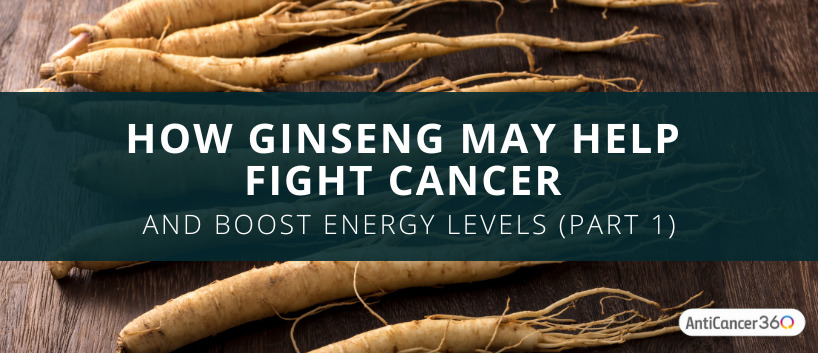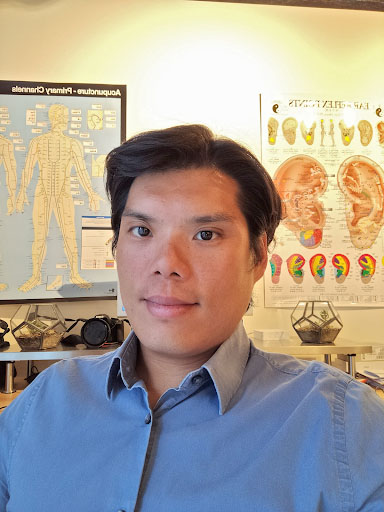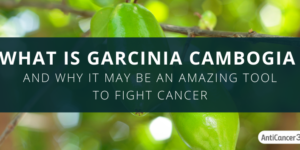When you’re confronting difficult and later-stage cancers, supporting your body in every way is essential. You want to strengthen your system with nutrients that can also help you “fight cancer in every direction.”
There are thousands of products on the market that claim to help fight cancer. It can be overwhelming to decide if you should take them – and which ones to take – and how much is safe.
We’re here to help you. Whether you’re here to get information from our articles or thinking of contacting us, we can show you the scientific research supporting many natural supplements’ potential anticancer benefits.
Certain natural supplements, like ginseng, can help strengthen and support your body to fight cancer more effectively. And do it so that it doesn’t interfere with your oncologist treatments. Depending on your situation, ginseng may be one of these options.
Read on to learn more about ginseng’s anticancer benefits in today’s post, which is Part 1 of a two-part series about this natural substance.
What is Ginseng?
Ginseng is a plant, and its roots contain substances known as ginsenosides. There are two main ginseng species used for their medicinal benefits. Panax ginseng, native to Asian countries, has been used for thousands of years in traditional Chinese medicine. Interestingly, the term Panax is derived from a Greek word for “all-healing.” [1] American ginseng, which grows in North and South America, was used in Native American medicine [2].
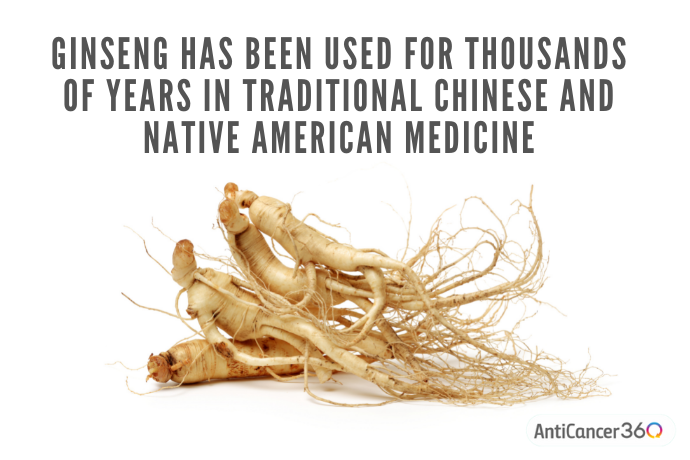
Today, ginseng is commonly found in many energy drinks. But some other ingredients (added sugar, caffeine, artificial sweeteners) in these beverages may have risks that often outweigh any health benefits [3].
Ginseng has become an interesting topic for cancer researchers because of its adaptogen ability. An adaptogen is defined as [4]:
“a plant extract that is held to increase the body’s ability to resist the damaging effects of stress and promote or restore normal physiological functioning.”
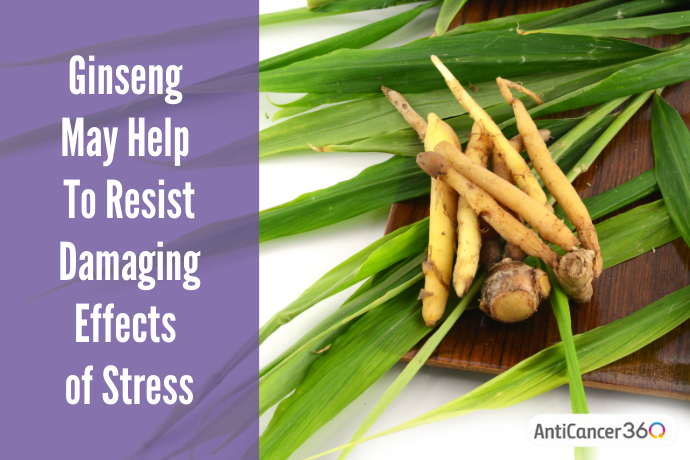
Let’s look at what researchers have learned about ginseng’s effects on cancer cells and how a ginseng supplement may benefit your overall treatment program.
How Ginseng May Interfere with Cancer Cell Growth: Disrupting Cancer Pathways
What are Cancer Pathways?
Our bodies are made up of tiny cells that you could see under a microscope. In our cells, nutrients are metabolized into energy to grow and live. Our cells use sugar, fats, and proteins and convert them into cellular energy. They use the energy to carry out thousands of processes that contribute to cell functions and growth. Our cells have natural limits in place, and eventually, cell death occurs, and new healthy cells form on a regular, controlled basis.
Our cells have a central nucleus that stores our genetic material (DNA). Cancer can begin if a single mutation (change) occurs in our DNA. (There’s much debate on how these mutations arise, but it’s probably due to some combination of genetic and environmental factors.) Over time, this mutation can lead to cell growth processes getting out of control, and the cells can become cancerous. These processes are known as cancer signaling pathways or cancer pathways.
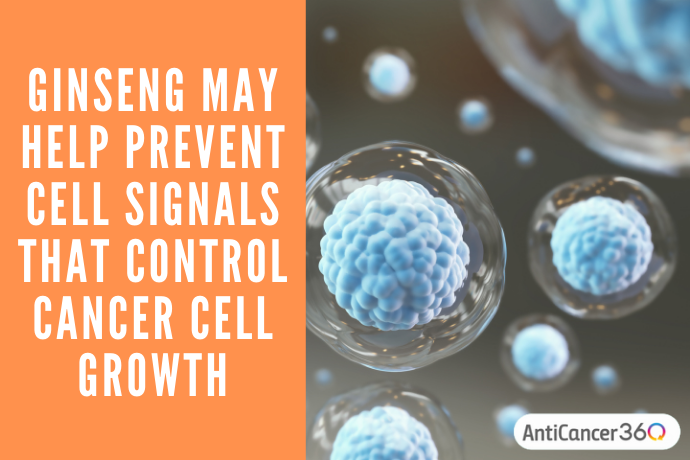
So when cancer pathways go unchecked, cancer cells can divide and replicate way too quickly. Tumors can form and, without the normal limits in place, the cells don’t die when they’re supposed to. And, as a result, some cancers keep on growing, uncontrolled [5].
In recent decades, the good news is that a wealth of cancer research has led to the discovery that many natural substances derived from plants have anticancer benefits. We strive to find the substances with the best available scientific evidence of anticancer action. These actions include interfering with cancer cell metabolism or by disrupting cancer pathways.
Up until this point, our blog has mainly highlighted natural substances that directly interfere with cancer cell metabolism (bergamot, milk thistle, ursolic acid). Now we’ll show you how some natural substances, like ginseng, can fight cancer from another, indirect angle: disrupting cancer pathways.
How Does Ginseng Interfere in Cancer Pathways?
Research has shown that one of the anticancer benefits of ginseng is how it may interrupt specific cancer pathways. One such pathway is known as STAT3. (Here, STAT stands for signal transducer and activator of transcription) [6].
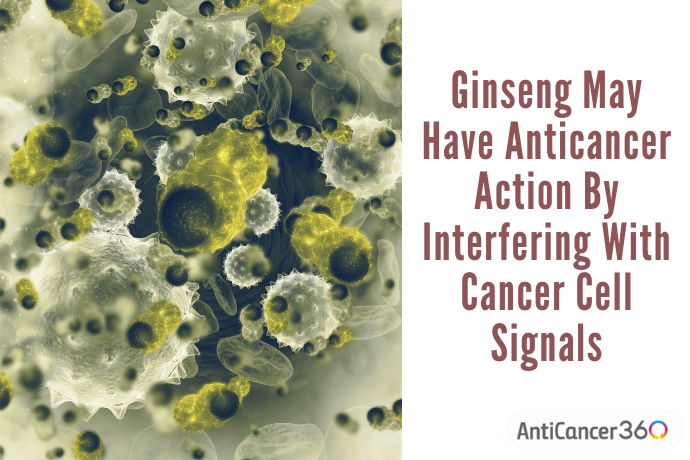
Transcription is the process used by cells to copy genes into messenger RNA (mRNA). Then the cell uses this mRNA as a blueprint to build specific proteins. These proteins carry out functions that our cells (and bodies) need for basic survival. From what experts have learned about STAT3, it seems to be a crucial pathway in regulating genes involved in cell proliferation and survival.
STAT3 appears hyperactive in some tumors, such as ovarian cancer. This hyperactivation of STAT3 seems to have a role in the transcription of proteins needed for glycolysis. Glycolysis is a process that cells use to convert sugar into energy. So the STAT3 pathway indirectly contributes to the vital metabolic process of glycolysis [7].
In a 2014 laboratory study, researchers demonstrated that applying Panax ginseng to ovarian cancer cells reduced the activation of STAT3. So, by interrupting the STAT3 pathway, the cells treated with ginseng showed lower rates of transcription of the proteins required to perform glycolysis steps [8].
This experiment demonstrated that cancer cells exposed to ginseng absorbed less sugar than the non-exposed cancer cells. Without enough sugar, cancer cells can’t convert it into energy. Without energy, all cells will eventually die.
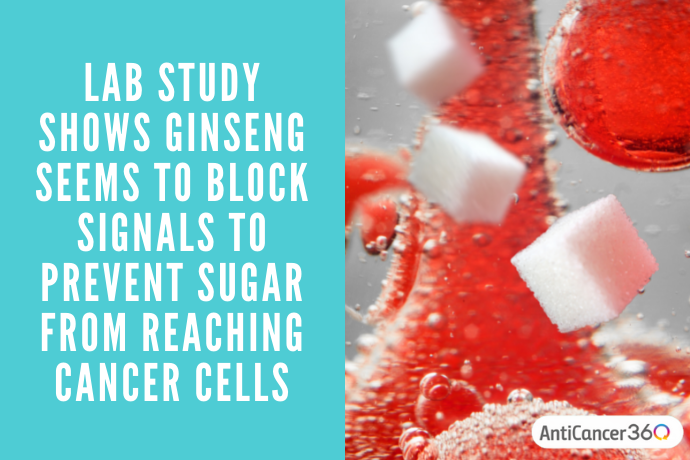
These scientists repeated this experiment on animals [9]. They gave ginseng to mice with ovarian cancer and found the same end result: the ovarian cancer cells absorbed less sugar.
Their research showed that this occurred because ginseng reduced the activation of STAT3. This in turn blocked the cancer cell from transcribing the mRNA (blueprints) for the glycolysis proteins. Although more research is needed, this study clearly shows ginseng’s anticancer potential.
Laboratory studies in rats have also shown how Panax ginseng exerts anticancer effects. Researchers found that Panax ginseng extracts decrease tumor necrosis factor (TNF) and decrease DNA damage [10].
There is conflicting evidence about the antioxidant and free radical scavenging activity of Panax ginseng. Some studies demonstrate the antioxidant behavior of ginseng, while others do not [11],[12].
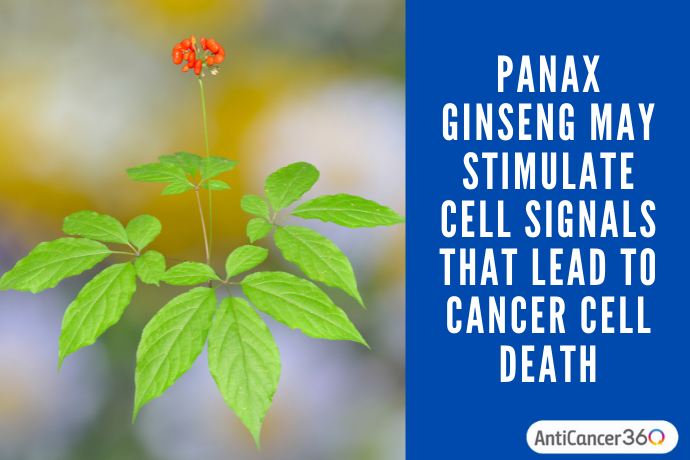
Overall, the anti-cancer effects of Panax ginseng may be linked to two main concepts, as shown by scientific studies:
- Panax ginseng extracts appear to block or slow down the activation of cellular pathways that are involved in cancer progression [13].
- Panax ginseng extracts seem to stimulate cellular pathways that lead to apoptosis (programmed cell death) of some cancer cells [14],[15].,
Besides the ways that ginseng can exert anti-cancer effects on cancer signaling processes, this natural compound may also interrupt a cell renewal process called autophagy. We’ll learn more about this interesting benefit of ginseng in Part 2 of our ginseng series.
Aggressive Integrative Approach with Ginseng
Next, we’ll look at some additional scientific studies that used an integrated approach with ginseng and conventional cancer treatments.
Ginseng may enhance the cancer-killing effects of certain chemotherapy drugs
Several studies have shown that when ginseng is administered to cancer cells along with certain cancer medications, the cancer-cell-killing ability (cytotoxicity) of the treatment seems to be enhanced. This enhancing effect of various forms and subtypes of ginseng have been shown in lab studies with the following chemotherapy drugs, some individually and some in combinations [16]:
- 5-fluorouracil (5FU)
- Irinotecan
- Mitomycin C
- Docetaxel
- Cisplatin
- Doxorubicin
- Paclitaxel
- Cytarabine
- Adriamycin
- Etoposide
- Daunorubicin
- Gemcitabine
- Epirubicin
The above studies have mostly been conducted in laboratories using cells in Petri dishes or small animals. But, it’s hard to deny the potential for the natural anticancer effects of ginseng. Especially when clinical (human) studies have also shown promising results.
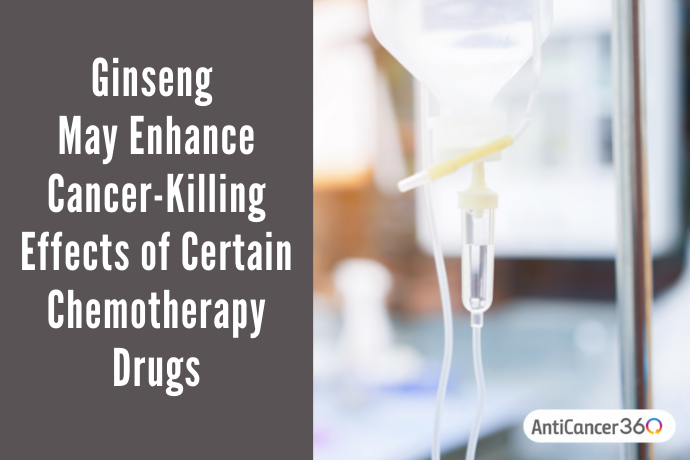
A recent study pooled data from 27 clinical trials that tested the combination of ginseng extracts with certain chemotherapy drugs to fight non-small-cell lung cancer. The drugs used in these trials included platinum-containing chemotherapy: cisplatin, carboplatin, and oxaliplatin [17].
Many of these trials were small. And some had undesirable methods, such as allowing the participants to know if they were receiving ginseng or a placebo. But, the overall results showed that, in general, the people who took ginseng in addition to their chemotherapy had numerous improved outcomes.
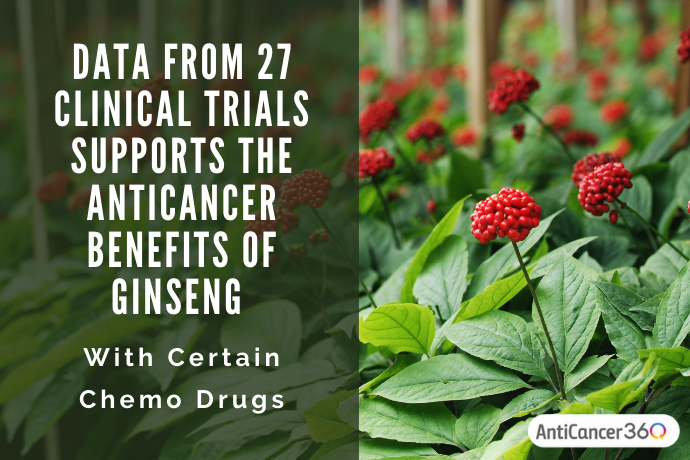
Compared to platinum-based chemotherapy alone, people with non-small-cell lung cancer who also took ginseng had numerous positive outcomes [18]:
- Increased 1-year survival rate
- Increased 2-year survival rate
- Improved quality of life assessment scores
- Improved blood levels of white blood cells, hemoglobin, and platelets
- Reduced vomiting side effect reaction
- Reduced blood level of vascular endothelial growth factor (VEGF)*
*VEGF is a signal protein produced by cells that stimulate the formation of blood vessels. Therefore, ginseng may help reduce the blood supply to tumors.
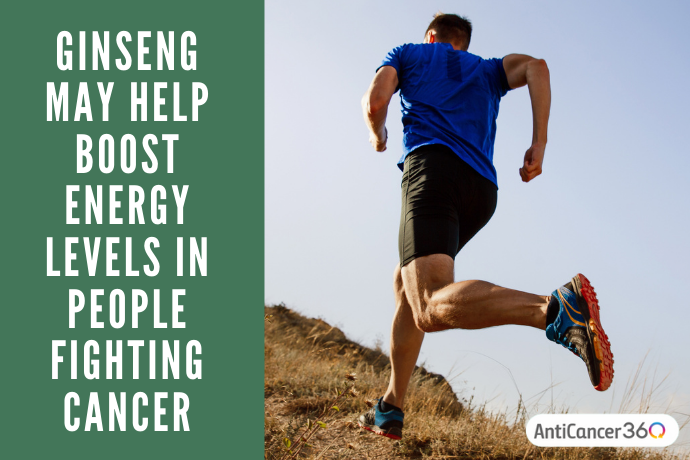
When we continue our ginseng series, in Part 2, we’ll look at the research that supports ginseng’s energy-boosting potential and the studies that demonstrate ginseng as a supportive tool to help improve cancer-related fatigue.
Will Ginseng Strengthen Your Personal Battle with Cancer?
Ultimately, you can see that there can be many potential benefits to adding a natural dietary supplement like ginseng to your overall anticancer program.
When using the “Aggressive Integrative Approach” to cancer, the goal is to fight cancer from every possible angle. This approach includes integrating natural supplements to fight cancer based on available evidence, despite limited human data, and doing it in a safe way that won’t interfere with your oncology treatments.
So now, what are your thoughts about incorporating ginseng into your plan? What are you doing to support your body? Are you currently taking ginseng or any other natural supplements? We would love to hear from you. Feel free to let us know in the comments below!
If you’re interested in using an Aggressive Integrative Approach for your case… you can learn more about our program by watching one of our free online webinars.
Please discuss the risk-versus-benefit potential with your healthcare professional before starting any natural supplement, including ginseng.
Are You A Good Candidate For Our Program?
If you’d like to learn more about the AntiCancer360 approach and see if we can help you… please watch our free online webinar to learn more about our approach. Then at the end of the webinar, you’ll be able to schedule a free call with us so that we can discuss your case in more detail
Dr. Patricia Weiser is one of AntiCancer360’s consultant pharmacists, science advisors, and medical writers. Her expertise helps us create safe herbal and supplement combinations and avoid potential drug interactions.
Patricia is a graduate of the University of Pittsburgh and a licensed pharmacist. She has clinical experience in both community and hospital pharmacy. She is passionate about integrative and preventative care and strives to empower her patients to take an active role in their health.

